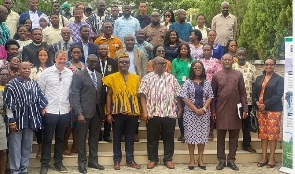 A group photograph of stakeholders during the commissiong exercise
A group photograph of stakeholders during the commissiong exercise
A Mosquito Ecology Research Facility has been commissioned at the University of Ghana (UG) to aid research into the biology of mosquitoes and their role on the environment.
The facility will help understand the nature of mosquitoes and develop effective interventions to reduce the mosquito population and transmission.
It aims to develop new interventions to supplement existing approaches to reduce malaria morbidities and mortalities in the country.
It was established by Target Malaria, a not-for-profit research consortium in partnership with the UG and funded by the Bill and Melinda Gates Foundation and Open Philanthropy.
Dr Fred Aboagye-Antwi, in country and Principal Investigator for Target Malaria, said the infrastructure would enhance mosquito research in a manner consistent with internationally recognised practice.
“The laboratory space will be used to investigate optimal rearing conditions that enhance mall mosquito fitness,” he added.
He said the lab would use gene drive approaches to insert a modification in malaria mosquitoes to affect their ability to reproduce.
Dr Aboagye- Antwi said the insectary has an insecticide testing lab to test the effectiveness of various insecticides to measure that new insecticides were developed to fight resistant mosquitoes.
Dr Samuel Kwaku Dadzie, Senior research fellow in Medical Epistemology at the Noguchi Memorial Institute for Medical Research, said Malaria continued to be a public health concern despite the huge investment made in its control.
He said the challenge of insecticide resistance and outdoor transmission threatened to erode success and that the lab would aid advanced research in Ghana and support the vision of having a malaria-free Ghana.
The facility, he said, would improve malaria vector research at the University of Ghana and beyond.
Dr Keziah Malm, Programmes Manager for the National Malaria Elimination Programme, said malaria accounted for over 30 per cent of Outpatient Department (OPD) cases and was still the number one cause of OPD attendance.
“Last year, Ghana recorded about five million cases of malaria, which resulted in 400,000 hospital admissions, and 155 deaths,” she said.
Dr Malm said the research into mosquitoes would also help reduce the incidence of another disease like elephantiasis.
Mosquitoes are common flying insects that live in most parts of the world. Over 3,500 types of mosquitoes can be found worldwide.
Not all mosquitoes bite people or animals. When mosquitoes bite people, the most common reactions to the bite are itching and swelling.
Some mosquitoes can be vectors that spread pathogens germ to people and animals. The germs that mosquitoes spread can make you sick.